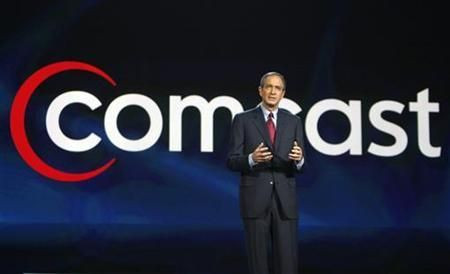Comcast Corporation (CMCSA) Earnings Preview: Q1 2014 Profits Soar With NBC Sochi Coverage, Broadband Demand
Announcement of merger with Time Warner Cable sparked concern over regulatory hurdles

Ever-growing appetites for two favorite American past times -- super-fast Internet and televised sports -- fueled a stellar three months for the country’s largest cable provider at a time when it is facing a mountain of scrutiny from consumer groups and federal regulators.
Comcast Corporation (NASDAQ:CMCSA) is expected to report significantly higher first-quarter earnings Tuesday, with demand for broadband Internet driving revenue growth at its Comcast Cable unit and NBC’s exclusive coverage of the 2014 Sochi Winter Olympics boosting ad dollars at NBCUniversal.
The Philadelphia-based cable and media conglomerate is expected to show net income of $1.7 billion for the period ended March 31, compared to $1.4 billion for the same period last year. Earnings per share are forecast to rise 26.3 percent to 64 cents per share, compared to 51 cents per share a year earlier.
Comcast’s revenue is expected to increase 11.2 percent to $17.03 billion, up from $15.31 billion a year earlier, according to analysts polled by Thomson Reuters. Comcast will report its results on Tuesday before the market opens. A conference call is scheduled for 8:30 a.m. ET.
The quarter was dominated, of course, by Comcast’s bombshell announcement in February that it plans to acquire Time Warner Cable Inc. (NYSE:TWC), the country’s No. 2 cable provider, in an all-stock deal then valued at $45.2 billion. The news sparked investor concern about the myriad of regulatory hurdles the company now faces.
Amy Yong, an analyst with Macquarie Capital, said such concerns are overblown. For one thing, Comcast is already the cable industry’s most heavily regulated company, thanks to a litany of conditions imposed upon it by federal regulators when it acquired NBCUniversal in 2011. In a research note on April 3, Yong called the Comcast-TWC merger “much more straight forward” than the Comcast-NBCUniversal merger, which saw heavy scrutiny from activists and antitrust officials anxious about the leverage Comcast would gain as both a provider of cable and Internet services as well as the owner of a multinational media company. “Comcast is in compliance with all the requirements tied to NBC,” Yong wrote.
Not everyone is satisfied, however. News of the proposed deal has set off a firestorm of criticism from politicians, consumer advocates, trade associations and other critics of media consolation, many of whom say Comcast already has a track record of flouting merger conditions when it sees fit.
Testifying before the U.S. Senate Judiciary Committee on April 9, James Bosworth, chief executive of a fledgling golf-lifestyle network called Back9Network Inc., cited Comcast’s recent court battle with Bloomberg L.P., which accused Comcast of discriminating against Bloomberg TV by placing it on a remote tier while giving the Comcast-owned CNBC preferential placement alongside major news networks like CNN and Fox News. Bloomberg argued that the placement violated a merger condition that required Comcast to put all news networks near one and other on the cable channel lineup -- a system known as “news neighborhoods.” The FCC agreed and ultimately ordered Comcast to relocate Bloomberg TV.
Critics of the merger also argue that a bigger Comcast would effectively become a “monopsony,” that is, a buyer with enough market power to drive down the price of goods. The merged Comcast-TWC would gain control of one-third of U.S. pay-TV market, and merger critics like the Consumer Federation of America say the company would gain enough leverage to negotiate significantly lower fees for the programming it carries, thereby hurting content companies and ultimately decreasing consumer choice.
Whatever happens, both Comcast and Time Warner Cable will be the subject of much scrutiny for the next several months. (The merger isn't expected to be completed until the end of the year.) And that means a lot of nervous shareholders: Comcast shares are down 13 percent since the announcement of the merger, as Vijay Jayant, analyst with ISI, pointed out in an April 15 research note.
But this is likely a minor blip in an otherwise robust industry. At Comcast Cable, the company’s core unit, ballooning consumer demand for broadband Internet service continues to drive up the unit’s average per-user revenue, which saw steady growth through the quarter and throughout the previous year. According to Tefris, Internet services now make up 27.3 percent of Comcast’s share price, compared to 38.2 percent for Comcast’s core business of cable television, a strong but shrinking segment of the pay-TV industry.
Comcast’s NBCUniversal unit, meanwhile, was helped by stronger ratings at its flagship NBC network. Although ratings for the February Winter Olympics in Sochi, Russia, fell short of those achieved four years ago for the Vancouver Olympics, the network’s overall viewership jumped 231 percent for the quarter. In a boastful blog post earlier this month, Comcast’s chief sports blogger, J.T. Ramsay, said NBC had its “most-watched quarter in network history.”
And Ramsay isn’t the only one singing Comcast’s praises. Out of 28 analysts polled by Thomson Reuters this quarter, 22 of them rated Comcast shares either a Buy or Strong Buy.
Comcast shares fell 0.14 percent on Friday to $49.10.
© Copyright IBTimes 2024. All rights reserved.






















